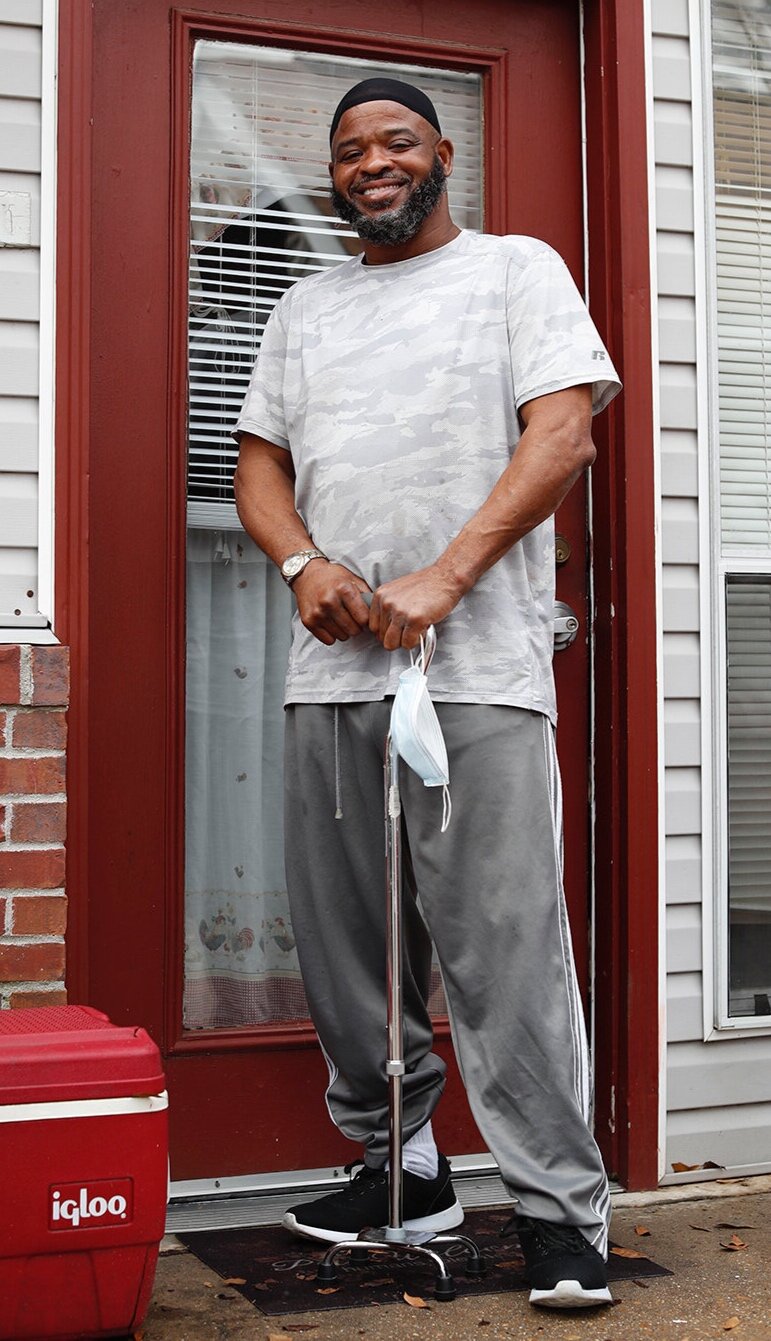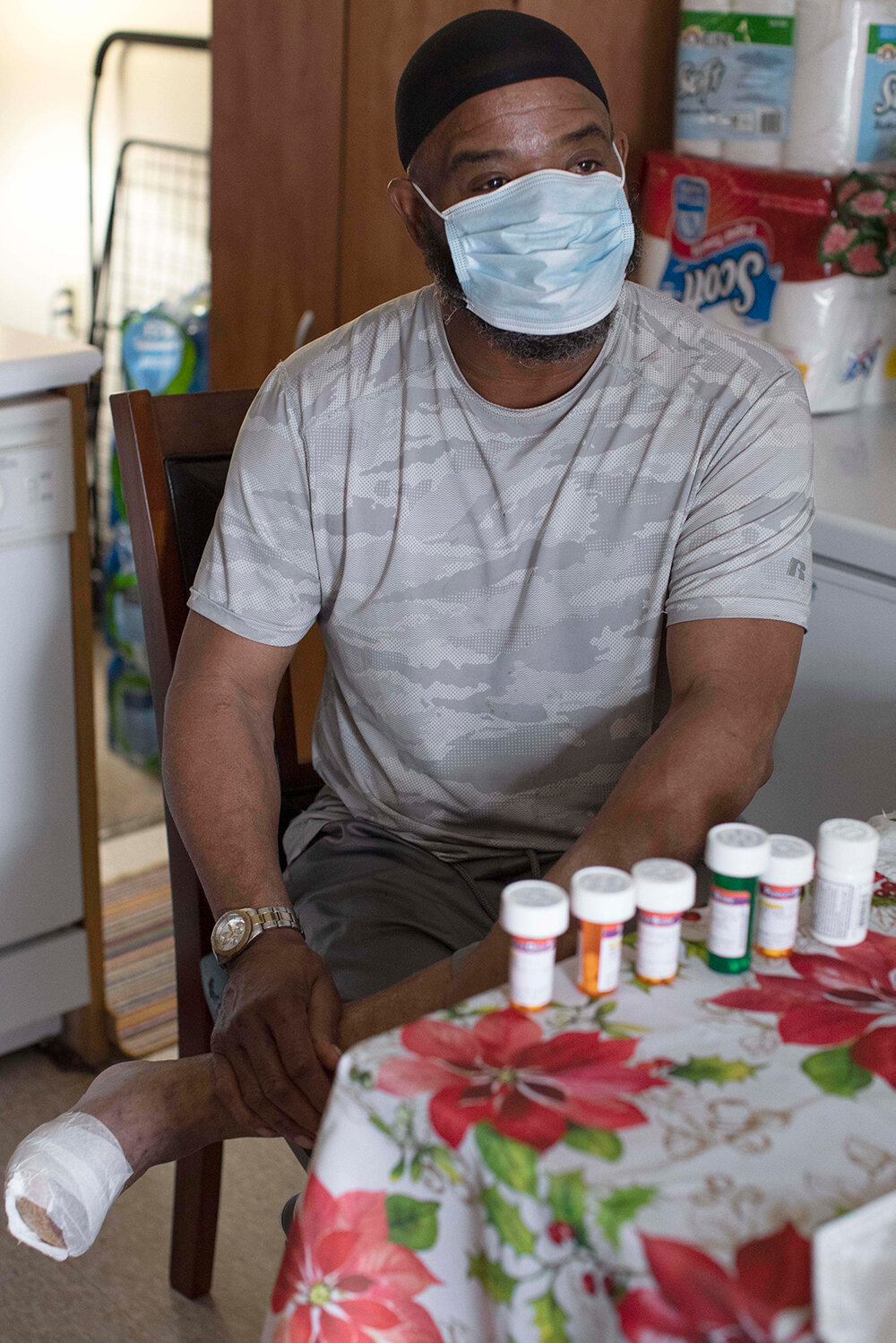Nonprofits help uninsured Mississippians patch together health care services
52 year-old Andrea Lane of Vicksburg, MS lost all toes on his left foot to the ramifications of unchecked diabetes. Without health insurance, and awaiting medicaid approval, the turbulence of diabetes threatens Lane's right foot, both hands and overall health. Sarah Warnock/MCIR
By Debbie Skipper
Mississippi Center for Investigative Reporting
Sitting in his home in New Orleans, Andrea Lane watched in alarm as his toes began turning a dark color.
Fearful, he headed to the hospital. “My toes just busted open and started filling with pus,” Lane said.
Doctors amputated eight of his toes.
That’s when Lane, who has since returned to his native Vicksburg, learned the cost of diabetes.
Andrea Lane, 52, of Vicksburg, who has lost eight toes to diabetes complications and also has hypertension, uses a patchwork of resources to meet his health care needs. “I need a primary care doctor,” he says."Diabetes can take a wrong turn. … I don’t want anybody to have to take care of me.” Sarah Warnock/MCIR
One of nine children, he said his mother also had diabetes – a family history that would have put him on his doctors’ radar as being predisposed to the dangers it presented and possibly headed off the outcome.
But Lane, 52, never had a doctor. He never underwent an annual physical. He has no insurance.
Since his toes were amputated in 2019, Lane has waited to be approved for Medicaid coverage. He’s twice been turned down. Four hospitalizations ranging from five to 15 days have left him owing more than $100,000.
And like so many other Mississippians lacking health insurance, he’s turned to a patchwork of resources to save him from further complications and an early death. He’s leaned on the Jackson-Hinds Comprehensive Health Center to get the insulin he can’t afford and the Diabetes Foundation of Mississippi to provide needles and glucose monitoring.
The father of three, who prepared food when he worked in New Orleans and also washed cars, saw his work history cut short by a chronic condition that caught early might have prevented the loss of his toes. He lost his food preparation job when he had difficulty standing for long periods of time.
He’s trying to save the remaining two toes on his right foot. He’s treating with betadine a sore that’s developed on the left foot where his toes were removed while dealing with the pain. “My foot like it is, I stay off of it. I use a four-legged cane,” Lane said.
He’s also now dealing with high blood pressure.
“I need wound care, but when I try to go in, the first they ask is do you have insurance,” he said.
“I need a primary care doctor,” he said.
“Diabetes can take a wrong turn. ... I don’t want anybody to have to take care of me,” said Lane, who lives with a sister.
Those lacking insurance, like Lane, turn to organizations like the Diabetes Foundation of Mississippi and the Health Advocacy Center Program for help.
Both try to help those who could qualify for Medicaid to enroll or direct them to free or sliding-fee clinics if they don’t.
The foundation serves as a conduit connecting diabetes patients to resources, like federal community health centers that can supply an older formulation of insulin at less than $25 a vial.
Andrea Lane, 52, of Vicksburg has lost eight toes to diabetes complications. He now is experiencing numbness in his fingers. Sarah Warnock/MCIR
“Insulin analogs are so expensive,” Irena McClain, associate director of the Diabetes Foundation, said, referring to synthetic-made insulins.
Insulin retails at $300 to $400 a vial, she said. “A lot of oral medications are running at $600 a month. That’s out of our (the foundation’s) price range” to provide, she said.
Pharmacy companies have patient assistance programs but require a doctor’s signature.
Finding help requires knowing where to go, what to ask and education.
“When kids with a chronic illness turn 19, they lose their Medicaid,” McClain said. “But their heart condition doesn’t go away. Their diabetes doesn’t go away.”
Roy Mitchell, executive director of the Mississippi Health Advocacy Program, said 64% of Mississippians suffer from chronic disease, such as diabetes, asthma and heart disease.
Those who fall into the coverage gap “don’t have a lot options,” he said.
And there are plenty of Mississippians who fall in that gap. More than one in five Mississippians don’t have health insurance.
“We screen people to see if they are eligible for Medicaid or if their children are eligible for Medicaid,” Mitchell said.
“There are little-known ways to gain Medicaid eligibility that we have found over the years to find people eligible for Medicaid,” he said. “We’ve had to do a lot of Medicaid outreach. We’ve done it not just with providers but also hospitals.”
If individuals don’t qualify for Medicaid, Tammy Bullock, Medicaid consumer advocate with Mississippi Health Advocacy, said she checks to see if they can sign up under the Affordable Care Act. “But a lot of these people work part-time jobs,” she said. “In rural areas, they don’t even make enough to afford the premiums.”
She said she’ll then refer them to the few free clinics in the state or sliding-fee clinics like the federal community health centers. The sliding fees are based on household size and income. But there is no consistency in how much uninsured patients have to pay out of pocket. It may be as low as $10 a visit or, in one case, as high as $65, she said.
In addition to diabetes, Andrea Lane, 52, of Vicksburg takes medication for hypertension. Sarah Warnock/MCIR
For specialized treatment, Bullock said she’ll connect them to financial assistance programs at hospitals. If they are still working, Vocational Rehabilitation will pay for such things as cataract removal with laser surgery, hearing aids and rotator cuff surgery. But Vocational Rehabilitation rarely covers hip and knee replacement surgery because such expensive procedures drain the agency’s funds, Bullock said.
The Mississippi Health Advocacy Program’s consumer assistance program was originally funded under the Affordable Care Act to help people enroll in the Health Marketplace. When the funding expired, the Trump administration didn’t renew it. Through private funding, the consumer program continued with a different objective, Mitchell said.
“It came out of people ending up on our doorstep, people who don’t have health insurance or who are having trouble with their health insurance carrier or provider,” Mitchell said.
Like the Health Advocacy Program, the Diabetes Foundation helps people navigate the system, McClain said. “If they are on Medicaid, we get them a case worker. The durable medical equipment companies seem to change every year. We have mothers calling: ‘Who can I contact to get my child’s (insulin) pump supplies?’ ”
Even Mississippians on Medicaid are limited to what they can get, she said. “Mississippi is one of the only states that Medicaid doesn’t pay for prostheses to those who have lost a limb.”
Because there are so many Medicare providers, the foundation tries to hook patients up with the equivalent of a case manager, she said.
The foundation has helped people taken in by Medicare provider companies’ “slick commercials” that say you may not have to pay a premium or deductible, she said. “These patients may wind up in that ‘donut hole’ where they have to pay for their medical supplies.”
Under Medicare Part D, this coverage gap (donut hole) begins after the insured and his or her drug plan have spent a certain amount for covered drugs — $4,130 on covered drugs in 2021.
There has been a revolution in diabetes management with new medications, protocols, insulin pumps and glucose monitoring devices, but none of that is available to those without insurance, McClain said.
“You can have the best technology in the world, but if you can’t get it into the hands of those who need it, what good is it?” he asked. “You’ve got to have a level playing field.”
Medicaid expansion would help do that, McClain and Mitchell said.
McClain said Medicaid would decrease amputations, keeping people healthy and working.
“Medicaid expansion saves lives,” Mitchell said. “It just says how high the stakes are. Health insurance is life or death.”
Health Help Mississippi
Health Help
Health Help is a not-for-profit program that provides comprehensive enrollment and advocacy services to eligible Mississippians attempting to enroll and/or reapply for state benefits in Medicaid/CHIP. The toll-free number, 1-877-314-3843, accepts statewide calls. Health Help services are free. Health Help is a Free Direct Assistance program of the Mississippi Health Advocacy Program.
Health Help Mississippi advocates are ready to assist with:
Medicaid & CHIP Enrollment: Consumer advocates can help you determine if you or your children are eligible for Medicaid/CHIP.
Finding Health Coverage: Consumer advocates can assist you in finding suitable healthcare options that meet the needs of you and your family.
Appeals and Complaints: Consumer advocates are dedicated to assisting consumers to file Medicaid appeals and complaints when necessary.
Understanding Health Coverage: Consumer advocates can help you interpret your Explanations of Benefits and other health summaries you may not understand.
Diabetes Foundation of Mississippi:
If you have any questions or comments please reach out to us using the information for contact form below:
601-957-7878
msdiabetes@msdiabetes.org
Community Health Centers:
Website: chcams.org/browse-community-health-centers/#central-ms
Aaron E. Henry Community Health Services Center Inc.
800 Ohio St.
Clarksdale, MS 38614
Phone: 662-624-2504; website: www.aehchc.org
702 Martin Luther King Road
Mound Bayou, MS 38762
Phone: 662-741-8800
Website: www.deltahealthcenter.org
Jackson Hinds Comprehensive Health Center (16 locations)
Dr. James Anderson Health Facility (Main Clinic)
3502 W. Northside Drive
Jackson, MS 39213
601-362-5321
Greater Meridian Health Clinic
2701 Davis St.
Meridian, MS 39301
Phone: 601-693-0118
Website: www.gmhcinc.org
Southeast Mississippi Rural Health Initiative Inc. (SeMRHI)
5488 US. Hwy 49
Hattiesburg, MS 39401
Phone: 601-545-8700
Website: www.semrhi.com
Free clinics:
1650 Carrol Drive, Biloxi, MS 39531
Phone: (228) 594-3640
Website: www.bethelfreeclinic.org
4707 Poplar Springs Drive, Meridian, MS 39305
Phone: 601) 286-5551
Website: freeclinicofmeridian.com
25 Martin Luther King Jr. Drive, Jackson, MS 39203Phone:
601-355-5161
Website: www.jacksonfreeclinic.org
St. Andrews Free Medical Clinic
815 Pennsylvania Ave., McComb, MS 3964
Website:www.standrewsmission.org
This report was produced in partnership with the Community Foundation for Mississippi’s local news collaborative, which is independently funded in part by Microsoft Corp. The collaborative includes the Clarion Ledger, the Jackson Advocate, Jackson State University, Mississippi Center for Investigative Reporting, Mississippi Public Broadcasting and Mississippi Today.
Debbie Skipper is managing editor of the Mississippi Center for Investigative Reporting, a nonprofit news organization that is exposing wrongdoing, educating and empowering Mississippians, and raising up the next generation of investigative reporters. Sign up for MCIR’s newsletters here.
Email her at debbie.skipper@mississippicir.org.
If you have any tips for our continued reporting on health care access in Mississippi, please email Jerry.Mitchell@MississippiCIR.org. You can follow him on Facebook, Twitter or Instagram.






